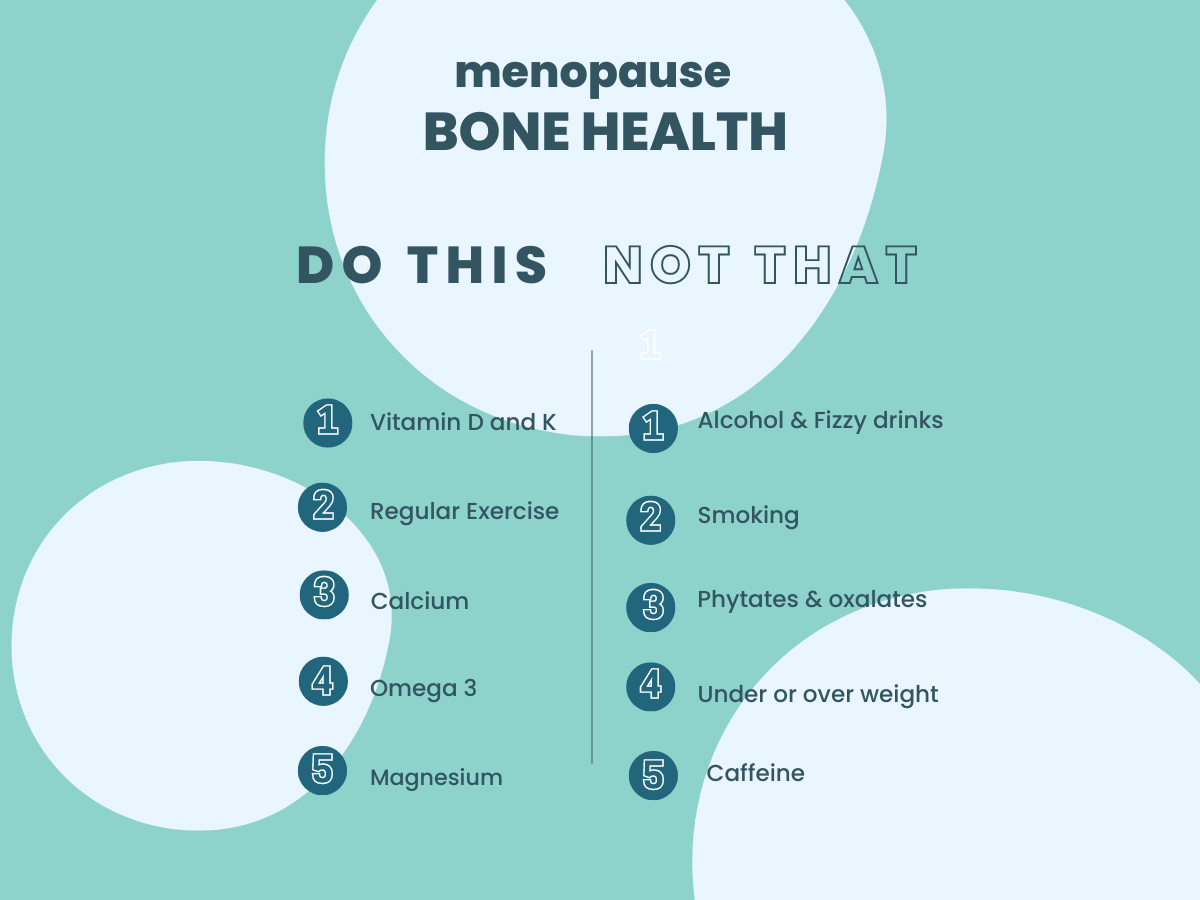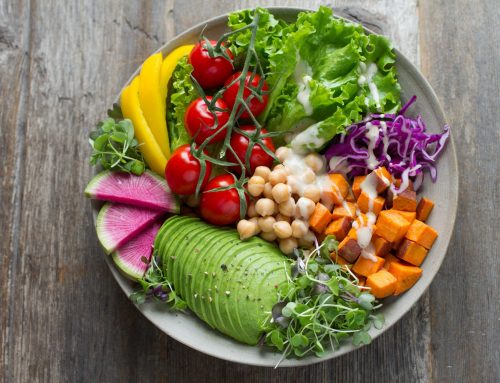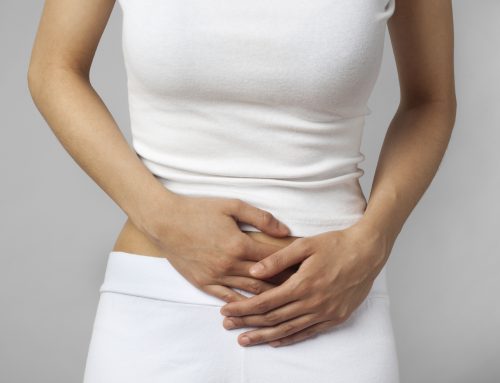Menopause Bone health is something many women are concerned about at menopause. Rightly so, as although menopause is a natural biological process during which hormonal changes occur in the body that affect bone health. At menopause a decrease in oestrogen production can lead to bone density loss and an increased risk of osteoporosis. Osteoporosis is an inflammatory disease that weakens the bones.
Oestrogen protects joints and reduces inflammation, so when estrogen levels drop at menopause, inflammation can increase. The risk of osteoporosis and osteoarthritis is also higher due to this lack of protection. A vicious cycle can develop as joint pain affects our ability to exercise, leading to muscle loss and weight gain. As testosterone falls in women along with oestrogen and progesterone, some women also find it harder to maintain muscle strength.
I am not against HRT. However it is often seen as the ‘only’ way to support your menopause bone health. In fact, nutrition and other lifestyle interventions play a crucial role in maintaining bone health during menopause. In this blog, we’ll discuss the key nutrients including calcium for menopause bone health. I also ask is dairy really that good and discuss anti nutirents that may be preventing your calcium from rweeaching your bones. There are nutrient and lifestyle hints and tips you can put in place today to support your menopause bone health. Thisis a holistic approach to bone health at menopause.
How Menopause Affects Bone Health
Women reach peak bone mass around the age of 25 to 30 years. This is because the skeleton has stopped growing and bones are at their strongest and thickest. The female hormone, oestrogen, plays an important role in maintaining bone strength. Oestrogen levels drop around the time of menopause, on average at the age of 50 years, results in increased bone loss. If your peak bone mass before menopause is less than ideal, bone loss around menopause may result in osteoporosis. About one in two women over the age of 60 years will experience at least one fracture due to osteoporosis.
A Healthy Menopause Bone Diet is a Varied Diet
I can’t over emphasise the importance of a healthy diet for bone health. As with most mechanisms in our bodies building bone requires an amazing amount of nutrients that work best together in our bodies. Not surprisingly there is evidence for antioxidants such as vitamin C and carotenoids (vegetable form of vitamin A) also phytoestrogens such as soya. Lycopene in tomatoes and cherry extract have all been studied!
Dairy products are still touted as the best for bones because of the high calcium and other bone nutrients. However, what’s forgotten is its bioavailability. Dairy foods have about 30% absorption. Plant foods like leafy greens contain less calcium but have a higher bioavailability, on average around 50%. So, a cup of cooked Bok Choy will have a similar amount of calcium to a cup of milk. Oxalates in vegetables (see below) do bind calcium in some foods but there are others you can include.
Nutrients for Bone Health
- Calcium
Calcium is known as the bone supplement, however you can have too much. Too much calcium through supplements or fortified foods can increase the risk of heart problems, including heart disease, heart attack, and stroke. This is because excess calcium can deposit in the arteries, leading to calcification and narrowing of the blood vessels. It’s important to note that getting calcium from food sources is generally safe and unlikely to cause heart problems. The body has a natural mechanism for regulating calcium absorption from food, so it’s less likely to accumulate in the arteries.
However, high doses of calcium supplements (more than 2000 milligrams per day) can increase the risk of heart problems, particularly if you are already have a higher risk of heart disease. Overall, it’s important to get calcium from a balanced diet. The recommendation for women over 50 is to consume no more than 1200 milligrams of calcium per day from food and supplements.A healthcare professional can help determine the appropriate intake of calcium for everyone based on their medical history and other risk factors.
Good sources of calcium include but are not limited to dairy products. Infact it is debated if dairy is as effective as other foods. Factors like fermentation support better absorption. Others include leafy green vegetables, tofu, and nuts particularly almonds. What is often forgotten is that calcium works best alongside other nutrients, and it is important to consume these too.
- Vitamin D
Vitamin D helps the body absorb calcium and maintain bone density. Women over 50 should aim for 800-1000 IU of vitamin D per day. The body can produce vitamin D through sun exposure, but it can also be obtained through foods like fatty fish, egg yolks, and fortified foods.
- Magnesium
Magnesium plays a vital role in bone health by helping to regulate calcium levels in the body. Good sources of magnesium include nuts, seeds, whole grains, and leafy green vegetables.
- Vitamin K
Vitamin K plays a crucial role in bone metabolism, helping to activate proteins that promote bone health. Good sources of vitamin K include leafy green vegetables, cruciferous vegetables, and fermented food, but also eggs and liver, pork and chicken.
- Healthy Fats
Omega 3 Fatty Acids in particular help balance inflammation in the body, which contributes to bone loss. Good sources of omega-3 fatty acids include fatty fish, flaxseed, and chia seeds. Other healthy fats include olive and avocado oil
In addition to a healthy diet supplement can be used to support bone health. I always advise getting professional advice as there are many factors to consider from the quality of supplements to the medications you take. I recommend some specific bone health supplements for my clients that contain an ideal combination.
Foods and drinks to Reduce
Overall, caffiene, salt increase urine output causing electrolyte imbalances and therefore calcium loss. It makes sense to reduce these generally unhealthy foods esoecially at menopause. Vitamin A in the form found in organ meats, and fish liver oils can also restrict calcium absorption. There is an association with bone health and fizzy pop. It is not just cola, with added caffeine, but the high content of phosphoric acid in most soft drinks. The excessive intake of phosphoric acid alters the calcium to phosphorus ratio and the overall imbalance of the acid-base in the body, resulting in decreased bone density and even osteoporosis and fractures.
Anti-nutrients
- Phytates, lectins and oxalates are natural compounds found in plant foods. They can interfere with the absorption of calcium, iron, phosphorus, and zinc. They reduce the amount of calcium available to your bones by binding with calcium and other minerals especially if they are eaten at the same time.
- Phytates and lectins are in seeds, nuts, beans, lentils, and grains. There are ways to reduce phytate content by soaking, sprouting and fermenting seeds, grains, and legumes.
- Lectins are proteins in legumes (beans, peanuts, soybeans), whole grain can interfere with the absorption of calcium, iron, phosphorus, and zinc. Soaking and boiling and dehydrating can reduce lectins.
- Oxalates can bind to calcium and prevent it from being absorbed. green leafy vegetables, tea, beans, nuts, beets. Tea, rhubarb, and spinach having the highest levels.
If you eat enough calcium rich foods and other bone supporting nutrients and drink plenty water anti nutrients will generally be managed. However, if your digestive health is poor, you might be absorbing more than is ideal. A nutritional therapist can help support intestinal health.
Lifestyle
- Regular Exercise: Weight-bearing exercises like walking, running, and weightlifting can help maintain bone density during menopause. Aim for at least 30 minutes of exercise most days of the week.
- Limit Alcohol and Caffeine: They both encourage bone loss so try to limit intake of alcohol to one drink per day and caffeine to about 2-3 cups of coffee.
- Quit Smoking: Smoking can increase the risk of osteoporosis and decrease bone density. Quitting is also essential for overall health, including bone health.
- Maintain a Healthy Body Weight: Being underweight or overweight can increase the risk of bone loss.
All in all, nutrition can play a crucial role in maintaining bone health during menopause. It is not just about calcium or even HRT. Including adequate vitamin D, magnesium, vitamin K, omega-3 fatty acids will optimise your bone health. Try to limit alcohol and caffeine intake as they deplete nutrients. As a functional medicine practitioner, I develop a unique plan for each patient based on their individual needs, health history, and lifestyle. By addressing the underlying root causes of bone loss, rather than just treating the symptoms a long-term solution can be achieved.
A good starting point is a Menopause Nutrition Analysis where I assess your food diary and nutrient intake in line with your health goals. An online call and recording are provided. Optional nutrient testing may be recommended.
Book a Discovery Call
References
Chen L, Liu R, Zhao Y, Shi Z. High Consumption of Soft Drinks Is Associated with an Increased Risk of Fracture: A 7-Year Follow-Up Study. Nutrients. 2020 Feb 19;12(2):530. doi: 10.3390/nu12020530. PMID: 32092922; PMCID: PMC7071508.
Sahni S, Mangano KM, McLean RR, Hannan MT, Kiel DP. Dietary Approaches for Bone Health: Lessons from the Framingham Osteoporosis Study. Curr Osteoporos Rep. 2015 Aug;13(4):245-55. doi: 10.1007/s11914-015-0272-1. PMID: 26045228; PMCID: PMC4928581.
The Royal Osteoporosis Society March 2021 Sarah Leyland, https://theros.org.uk/blog/2021-03-22-what-s-the-menopause-got-to-do-with-bone-health/
Shieh A, Ruppert KM, Greendale GA, Lian Y, Cauley JA, Burnett-Bowie SA, Karvonen-Guttierez C, Karlamangla AS. Associations of Age at Menopause With Postmenopausal Bone Mineral Density and Fracture Risk in Women. J Clin Endocrinol Metab. 2022 Jan 18;107(2):e561-e569. doi: 10.1210/clinem/dgab690. PMID: 34537850; PMCID: PMC8764341.







